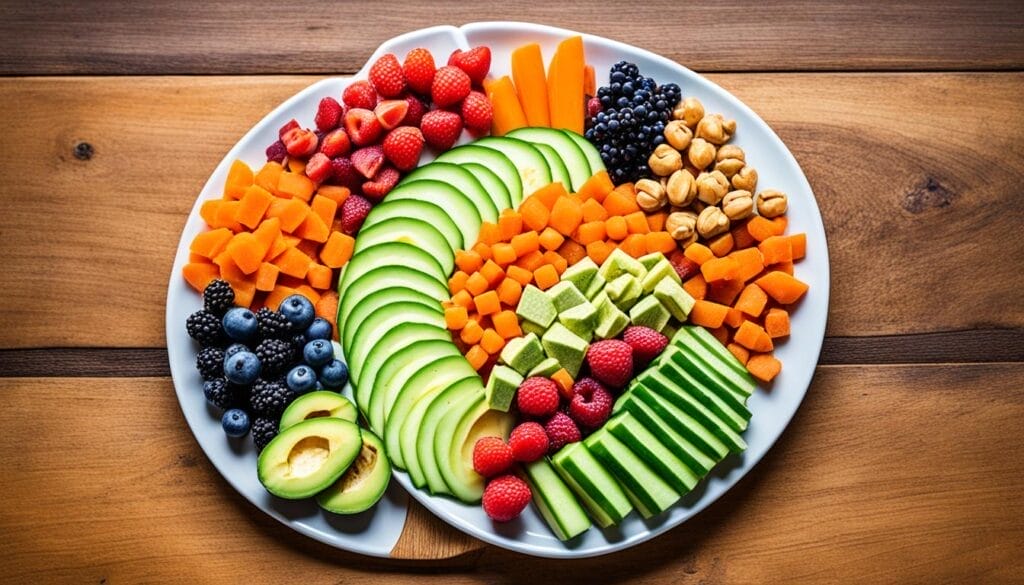As a lifelong lover of food, I never thought I could give up meat. The sizzle of a juicy steak on the grill, the aroma of bacon wafting through the kitchen, and the comforting taste of a roast chicken on a Sunday afternoon were all essential elements of my culinary repertoire.
But as time went on, I started to become more conscious of the impact of my food choices on my health and the environment. I began to question whether there was a way to enjoy delicious, satisfying meals without relying on animal products.
One day, while scrolling through social media, I came across a mouthwatering picture of a colourful salad packed with vibrant vegetables, crunchy nuts, and tangy dressing. It was captioned “Meat-free Monday inspiration” and sparked something inside me.
I realised that a vegetarian diet could offer not only a healthier lifestyle but also a more sustainable approach to eating. So I thought, why not give it a try?
At first, I thought it would be a daunting task to replace the meat in my meals. But as I began exploring the world of plant-based cuisine, I discovered a whole new realm of flavours, textures, and possibilities. I experimented with meat-free meals, trying out different recipes and incorporating a variety of ingredients into my dishes. From hearty lentil stews to zesty tofu stir-fries, there was no shortage of delicious options to explore.
Not only did my taste buds thank me, but my body did too. I noticed that I had more energy, felt lighter, and my digestion improved. I also learned that a plant-based diet could reduce the risk of chronic diseases such as heart disease, cancer, and diabetes. The more I delved into the research, the more convinced I became that I had made the right choice for my health and the planet.
Today, I am proud to say that whilst I haven’t fully embraced a vegetarian lifestyle, I incorporate it a lot more into my weekly food choices. I’ve discovered a whole new world of meat-free meal ideas that have transformed the way I eat. It’s not about restriction or deprivation; it’s about opening my mind and embracing the abundance of nature’s bounty.
Whether it’s a vibrant Buddha bowl packed with fresh veggies, a comforting curry with fragrant spices, or a satisfying plant-based burger, every meal is a celebration of nourishment and compassion.
Key Takeaways:
- A vegetarian diet offers a healthier lifestyle and a more sustainable approach to eating.
- Exploring the world of plant-based cuisine opens up a whole new realm of flavors, textures, and possibilities.
- A plant-based diet can improve energy levels, digestion, and reduce the risk of chronic diseases.
- Meat-free meal ideas are abundant and can be just as delicious and satisfying as their meat counterparts.
- Adopting a vegetarian lifestyle is a journey of nourishment and compassion.
Benefits of a Plant-Based Diet for Health and Weight Management
Research shows that adopting a plant-based diet can have numerous health benefits. It can help reduce body weight, blood pressure, and the risk of heart disease, cancer, and diabetes. Plant-based diets are typically lower in saturated fats and cholesterol and higher in fibre, vitamins, minerals, and antioxidants, which contribute to overall better health.
Plant-based diets also promote weight management due to their high fibre content and lower calorie density. They can enhance digestion, increase metabolism, and improve gut health. By choosing plant-based protein sources and incorporating a variety of plant foods into meals, individuals can meet their nutritional needs and support optimal health and weight management.
One study conducted by an American University found that participants who followed a plant-based diet for six months experienced a significant reduction in body weight, cholesterol levels, and blood pressure. They also showed improvements in insulin sensitivity and overall cardiovascular health. Another study published in the Journal of Nutrition found that individuals who consumed a plant-based diet had a lower risk of developing obesity-related diseases, such as type 2 diabetes and metabolic syndrome.
A plant-based diet can provide essential nutrients for maintaining overall health and well-being. The table below highlights key nutrients found abundantly in plant-based foods:
| Nutrient | Sources |
|---|---|
| Protein | Legumes, tofu, tempeh, quinoa, nuts, seeds |
| Fiber | Whole grains, fruits, vegetables, legumes, nuts, seeds |
| Vitamins | Fruits, vegetables, fortified plant-based milks, whole grains |
| Minerals | Leafy greens, legumes, whole grains, nuts, seeds |
| Antioxidants | Berries, leafy greens, nuts, seeds, beans |
By incorporating these nutrient-rich plant-based foods into your diet, you can ensure optimal health and weight management. It’s important to note that if you have specific dietary restrictions or medical conditions, consulting with a healthcare professional or registered dietitian can help ensure you’re meeting all of your nutritional needs.
Overall, embracing a plant-based diet offers a range of health benefits and supports weight management. The next section will explore the environmental impact of adopting a plant-based diet and its role in promoting sustainability.
“A plant-based diet is not only good for your health but also contributes to a more sustainable future.” – Dr. Jane Green
The Environmental Impact of a Plant-Based Diet
The meat industry has a significant impact on the environment, contributing to water scarcity, soil degradation, extinction of plants and animals, and greenhouse gas emissions. Animal agriculture uses a large amount of fresh water, with the production of a single quarter-pound hamburger patty requiring 460 gallons of water.
Adopting a plant-based diet can help reduce the environmental burden by conserving water resources and reducing greenhouse gas emissions. If everyone in the UK chose to have a meatless day once a week, it would have a significant positive impact on the environment, equivalent to taking millions of cars off the road. Plant-based diets are more sustainable and can contribute to a healthier planet.

By shifting towards a plant-based diet, we can lessen the strain on the planet’s resources. Not only does it decrease the demand for water and reduce greenhouse gas emissions, but it also helps combat deforestation caused by animal farming. Livestock rearing is a major driver of deforestation as forests are cleared to create land for grazing and growing animal feed crops.
“Embracing a plant-based diet can be a powerful way to make a positive impact on the planet and protect the environment for future generations.”
The Role of Sustainable Farming in Plant-Based Diets
When it comes to sustainability, the production methods of plant-based foods play a crucial role. Sustainable farming practices prioritise soil health, minimise chemical inputs, and promote biodiversity. By supporting local and organic farmers, we can contribute to the preservation of natural ecosystems and reduce the environmental footprint of our food choices.
Environmental Benefits of Plant-Based Diets
Choosing a plant-based diet not only benefits our health but also helps mitigate climate change. According to studies, a shift towards plant-based diets could reduce greenhouse gas emissions by up to 70% by the year 2050. This reduction is mainly due to the lower emissions associated with plant agriculture compared to animal agriculture.
Moreover, land use efficiency is significantly higher in plant-based food production. It takes far less land to produce plant-based foods compared to animal products. This means that by consuming plant-based meals, we can protect valuable natural habitats and preserve biodiversity.
| Environmental Impact | Plant-Based Diet | Meat-Based Diet |
|---|---|---|
| Water Consumption | Conserves water resources | Requires large amounts of water for livestock and feed crops |
| Greenhouse Gas Emissions | Reduces emissions compared to animal agriculture | Significantly contributes to greenhouse gas emissions |
| Land Use | Requires less land for food production | Requires vast amounts of land for grazing and growing animal feed |
| Deforestation | Helps combat deforestation by reducing demand for animal farming | Major driver of deforestation due to land requirements |
Transitioning to a plant-based diet is a tangible way for individuals to contribute to the health of the planet. By making conscious choices and embracing sustainability, we can ensure a brighter future for ourselves and future generations.
Meeting Nutritional Needs on a Vegetarian Diet
One of the common concerns about transitioning to a vegetarian diet is meeting nutritional needs. But rest assured, a plant-based diet can indeed provide all the necessary nutrients for optimal health. Let’s explore some key nutrients to consider and how they can be obtained on a vegetarian diet.
Protein
Protein is often a hot topic when it comes to vegetarian nutrition. However, there are plenty of plant-based sources that can help you meet your protein needs. Foods like soy, beans, nuts, seeds, and non-dairy milk products are all excellent sources of protein. Incorporating these into your meals can ensure you’re getting enough of this essential macronutrient.
Vitamins and Minerals
While following a vegetarian diet, it’s important to pay attention to certain vitamins and minerals that may require additional attention.
| Nutrient | Plant-Based Sources |
|---|---|
| B12 | Fortified plant-based milks, nutritional yeast, fortified cereals, supplements |
| Iron | Dark leafy greens, legumes, fortified cereals, tofu, whole grains, nuts, seeds |
| Calcium | Fortified plant-based milks, tofu, kale, broccoli, almonds |
| Iodine | Iodised salt, sea vegetables (like seaweed) |
| Omega-3 Fatty Acids | Flaxseeds, chia seeds, hemp seeds, walnuts |
| Vitamin D | Sunlight exposure, fortified plant-based milks, supplements |
By incorporating these nutrient-rich plant-based foods into your diet, you can ensure a well-rounded intake of essential vitamins and minerals.
A Variety of Plant Foods
A key principle of vegetarian nutrition is to consume a variety of plant foods. This ensures that you’re getting a broad spectrum of nutrients and helps maintain a balanced intake. Including a colourful array of vegetables, fruits, whole grains, legumes, nuts, and seeds in your meals can provide a wide range of beneficial compounds and micronutrients.
Remember, on a vegetarian diet, it’s not just about eliminating meat but also about embracing a diverse and nourishing plant-based lifestyle. By focusing on a wide range of plant foods and incorporating the key nutrients mentioned above, you can confidently meet your nutritional needs while enjoying the benefits of a plant-based diet.
Tips for Transitioning to a Vegetarian Diet
Transitioning to a vegetarian diet can be an exciting and rewarding journey. Whether you’re motivated by health, environmental, or ethical reasons, making the shift to a plant-based lifestyle can positively impact your well-being and the planet.
Here are some tips to help you navigate the transition with ease:
- Start with small changes: Begin by incorporating meatless meals once a week. This gradual approach allows your taste buds and body to adapt to new flavours and textures. As you become more comfortable, you can increase the frequency of meatless days.
- Experiment with new recipes: Explore the vast world of vegetarian cuisine and try out new recipes. From lentil soups to vegetable stir-fries, there’s a whole range of delicious plant-based dishes waiting to be discovered. Don’t be afraid to get creative and add plant-based ingredients to your favourite dishes.
- Plan your meals: Planning your meals in advance can help you stay on track and ensure a balanced and nutritious diet. Include a variety of plant-based proteins, such as beans, tofu, and tempeh, along with plenty of fruits, vegetables, whole grains, and healthy fats. Consider using vegetarian meal planning resources and apps for inspiration.
- Communicate with your family: If you’re transitioning to a vegetarian diet while living with non-vegetarian family members, open up a conversation about your dietary choices. Share your reasons for going vegetarian and discuss ways to accommodate everyone’s preferences. Encourage your loved ones to try some of the plant-based meals you enjoy.
- Be prepared when dining out: Eating out as a vegetarian doesn’t have to be a challenge. Research vegetarian-friendly restaurants in your area or check out menus online before going out. Look for dishes that feature plant-based proteins like tofu or chickpeas, and don’t be afraid to ask for modifications to suit your needs.
Incorporating filling, fibre-rich whole grains like quinoa or brown rice, along with plant-based proteins, can help you stay satisfied throughout the day. Remember to include healthy fats from sources like avocado, nuts, and seeds to support overall nutrition. Celebrate each milestone along your vegetarian journey, and embrace the positive changes you’re making for your health and the planet.

The Ubiquity of Veganism - A Path to Health and Wellness
Veganism is on the rise, and it’s no surprise why. More and more people are embracing vegan diets for their numerous health benefits, ethical considerations, and positive impact on the environment. A vegan diet can have a transformative effect on your well-being, promoting overall health and wellness.
By adopting a vegan lifestyle, you can reduce the risk of certain cancers, lower cholesterol and blood sugar levels, promote weight loss, and improve heart health. Vegan diets focus on whole, unprocessed plant foods, which are rich in essential nutrients, fibre, and antioxidants. These nutrient-dense foods support optimal health and contribute to a stronger immune system.
One of the key benefits of veganism is its positive impact on the environment. By eliminating animal products from our diets, we can significantly reduce greenhouse gas emissions, conserve water resources, and combat deforestation caused by the meat industry. Choosing veganism is a compassionate and sustainable way to eat, allowing us to protect animals and preserve our planet for future generations.

Embracing Vegan Snacks for Everyday Delight
Transitioning to a vegan diet doesn’t mean sacrificing flavour and variety. There is a plethora of delicious vegan snacks available to satisfy all your cravings. From crunchy kale chips and roasted chickpeas to creamy cashew cheeses and decadent dark chocolate, vegan snacks offer a world of flavours and textures to indulge in.
Include a variety of vegan snacks in your daily routine to keep your taste buds engaged and your energy levels high. Nourishing options like fresh fruits and vegetables, mixed nuts, hummus with carrot sticks, or homemade granola bars can provide the nutrients and satisfaction you need throughout the day.
“There is a common misconception that vegan diets lack taste and excitement. However, with a bit of creativity and exploration, you’ll discover a whole new world of culinary delights that are not only delicious but also incredibly nourishing.”
– Jane Thompson, Vegan Chef and Cookbook Author.
The Vegan Journey: A Path to Personal and Planetary Wellness
Embracing veganism is not just about improving your own health; it’s about making a positive impact on the world around us. By choosing a plant-based diet, you are actively contributing to the well-being of animals and the preservation of our environment.
Take the first step on your vegan journey and experience the incredible health benefits and ethical rewards that come with it. Explore new recipes, discover innovative vegan products, and share your love for plant-based eating with others. Together, we can create a healthier, more compassionate world – one meal at a time.
Summing Up
Embracing a vegetarian or plant-based diet can bring about remarkable benefits for both personal health and the environment. By prioritising whole, minimally processed plant foods and incorporating a diverse array of nutrient-rich ingredients, we can easily meet our nutritional needs while delighting in delicious and satisfying meals.
Making the transition to a vegetarian diet can be accomplished gradually, taking small steps and exploring new recipes along the way. It is crucial to be mindful of meeting nutrient requirements and ensuring meal satisfaction in order to foster long-term adherence to a vegetarian lifestyle.
By embracing a plant-based diet, we not only protect our own health, but also contribute to the well-being of the planet.
FAQ
How can I start embracing a vegetarian diet?
You can start by incorporating small changes, such as having a meatless day once a week. Experimenting with new recipes and incorporating plant-based ingredients into familiar dishes can also make the transition more enjoyable.
Will a vegetarian diet provide all the necessary nutrients?
Yes, a well-planned vegetarian diet can provide all the necessary nutrients for optimal health. It is important to consume a variety of plant foods to ensure a balanced intake of essential nutrients.
What are the health benefits of a plant-based diet?
Plant-based diets can help reduce body weight, blood pressure, and the risk of heart disease, cancer, and diabetes. They are typically lower in saturated fats and cholesterol and higher in fibre, vitamins, minerals, and antioxidants, contributing to overall better health.
How can a vegetarian diet benefit the environment?
Adopting a plant-based diet can help reduce the environmental burden by conserving water resources and reducing greenhouse gas emissions. It can contribute to a more sustainable and healthier planet.
How can I meet my nutritional needs on a vegetarian diet?
By choosing plant-based protein sources and incorporating a variety of plant foods into meals, you can meet your nutritional needs. Key nutrients to consider include B12, iron, calcium, iodine, omega-3 fatty acids, and vitamin D, which can be obtained from plant-based foods or through fortified plant-based milks and supplements if needed.
What tips can you provide for transitioning to a vegetarian diet?
Start with small changes, plan meals in advance, be prepared when dining out, and communicate with family members about your dietary choices. Including filling, fibre-rich whole grains, plant-based proteins, and healthy fats in your meals can help ensure satisfaction and a balanced intake of nutrients.
Is veganism a healthy diet choice?
Yes, vegan diets can provide numerous health benefits, such as reducing the risk of certain cancers, lowering cholesterol and blood sugar levels, promoting weight loss, and improving heart health. They focus on whole, unprocessed plant foods and eliminate animal products, contributing to a more sustainable and compassionate way of eating.
Source Links
- https://news.stanford.edu/report/2021/05/06/embracing-plant-based-diet/
- https://healthymaster.in/blogs/blog/embracing-vegan-diet-a-path-to-health-and-wellness
- https://www.linkedin.com/pulse/successfully-embracing-plant-based-diet-lifestyle-me-my-wellness-igb1c?trk=public_post_main-feed-card_feed-article-content
Share Me:
READY TO UNLEASH
YOUR BEST SELF?
Click “Sign Me Up!” And Start Your Fitness Transformation!





